The GOP’s Self-Inflicted Wound
As the leading Republican presidential candidates rant and rave about deporting 11 million immigrants, fighting some kind of world war against Islam, implementing gimmicky tax plans that would bankrupt the nation and other such madness, keep one thing in mind: The party establishment brought this plague upon itself.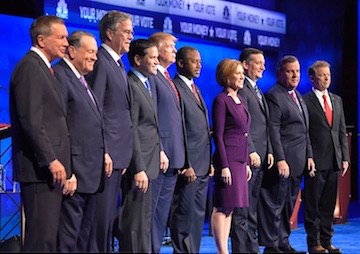 Republican presidential candidates, from left, John Kasich, Mike Huckabee, Jeb Bush, Marco Rubio, Donald Trump, Ben Carson, Carly Fiorina, Ted Cruz, Chris Christie and Rand Paul. (Mark J. Terrill / AP)
Republican presidential candidates, from left, John Kasich, Mike Huckabee, Jeb Bush, Marco Rubio, Donald Trump, Ben Carson, Carly Fiorina, Ted Cruz, Chris Christie and Rand Paul. (Mark J. Terrill / AP)
Republican presidential candidates, from left, John Kasich, Mike Huckabee, Jeb Bush, Marco Rubio, Donald Trump, Ben Carson, Carly Fiorina, Ted Cruz, Chris Christie and Rand Paul. (Mark J. Terrill / AP)
As the leading Republican presidential candidates rant and rave about deporting 11 million immigrants, fighting some kind of world war against Islam, implementing gimmicky tax plans that would bankrupt the nation and other such madness, keep one thing in mind: The party establishment brought this plague upon itself.
The self-harming was unintentional but inevitable — and should have been foreseeable. Donald Trump and Ben Carson didn’t come out of nowhere. Fully half of the party’s voters didn’t wake up one morning and decide, for no particular reason, that experience as a Republican elected official was the last thing they wanted in a presidential candidate.
The insurrection that has reduced Jeb Bush to single-digit support while Trump and Carson soar is nothing more than the understandable reaction of the jilted. Republican leaders have spent the years of the Obama presidency inflaming GOP base voters with extreme rhetoric and wooing them with empty promises. The establishment won its goal — electoral gains in Congress and many statehouses — but in the process may have lost the party.
Unrest was brewing among true-believer conservatives even before Barack Obama took office as the first African-American president. George W. Bush had angered the base with his budget-busting expenditures for Middle East wars and a new prescription drug benefit under Medicare. What had happened to the party’s commitment to fiscal responsibility?
The final straw for many came when the financial crisis hit in 2008 and Bush, in his final days, won authorization of the $700 billion Troubled Asset Relief Program — a massive bailout for the big Wall Street banks. It was a wholesale violation of conservative principles that helped inspire the birth of the tea party movement.
With the economy still in crisis, Obama took actions that further riled conservatives — pushing through Congress a messy economic stimulus package and rescuing General Motors and Chrysler. And then the president turned to health care, ultimately winning passage of the Affordable Care Act.
The GOP saw a golden political opportunity. Rather than work with Obama toward compromise, Republicans positioned themselves as implacable foes of the president and all he stood for.
As the tea party increasingly came to demonize Obama for being an alleged Muslim or socialist — and even to delegitimize him as supposedly having been born in Kenya — the Republican establishment shamefully played along despite knowing that none of this rubbish was true.
The result was a sweeping victory in the 2010 election. Republicans captured the House by electing dozens of tea party-backed candidates, who came to Washington with revolution on their minds.
Experienced GOP politicians who should have known better allowed this insurgency to push the party into a series of showdowns with Obama that Republicans could not possibly win. Having told the base that great things could be accomplished by shutting down the government or threatening default on the national debt, the establishment had to say, in effect, never mind.
Voters began to realize that they’d been had. The Republican leadership talked a good game at election time, but never delivered.
Is it any wonder, then, that 51 percent of Republican voters (according to the Real Clear Politics poll average) say they favor Trump, Carson or Carly Fiorina, none of whom has ever held public office? Or that another 11 percent support Ted Cruz, whose career in the Senate has consisted of vehemently opposing his own party’s leadership as a bunch of weak-kneed quislings?
If you add it up, roughly six of 10 GOP voters tell pollsters they reject any candidate the Republican establishment likes. That amounts to a party in open revolt.
There are those in the Republican establishment who look at prior elections and predict the outsider candidates will eventually fade. There are those who believe the fear of terrorism, post-Paris, will lead voters to choose safety over adventure. Perhaps this is something other than whistling past the graveyard, but that’s what it sounds like to me.
Are voters who have been on the raucous, anything-goes Trump bandwagon for months going to fall meekly in line behind someone like Bush or Marco Rubio? It gets harder and harder to imagine such a thing.
Meanwhile, the whole field is being pulled so far to the right on issues such as immigration and taxes that any of the likely nominees will have a hard time winning the general election. This is a fine mess the Republican Party has gotten itself into, and we won’t know until the early primaries whether there’s any hope of a way out.
Your support matters…Independent journalism is under threat and overshadowed by heavily funded mainstream media.
You can help level the playing field. Become a member.
Your tax-deductible contribution keeps us digging beneath the headlines to give you thought-provoking, investigative reporting and analysis that unearths what's really happening- without compromise.
Give today to support our courageous, independent journalists.


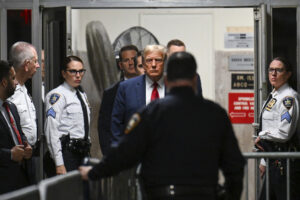
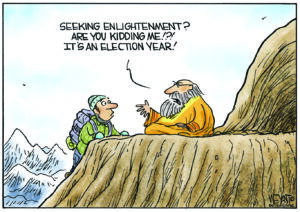
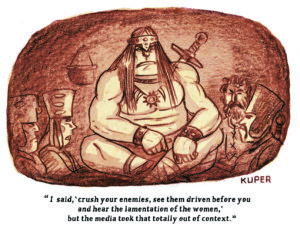
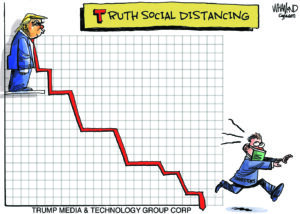



You need to be a supporter to comment.
There are currently no responses to this article.
Be the first to respond.